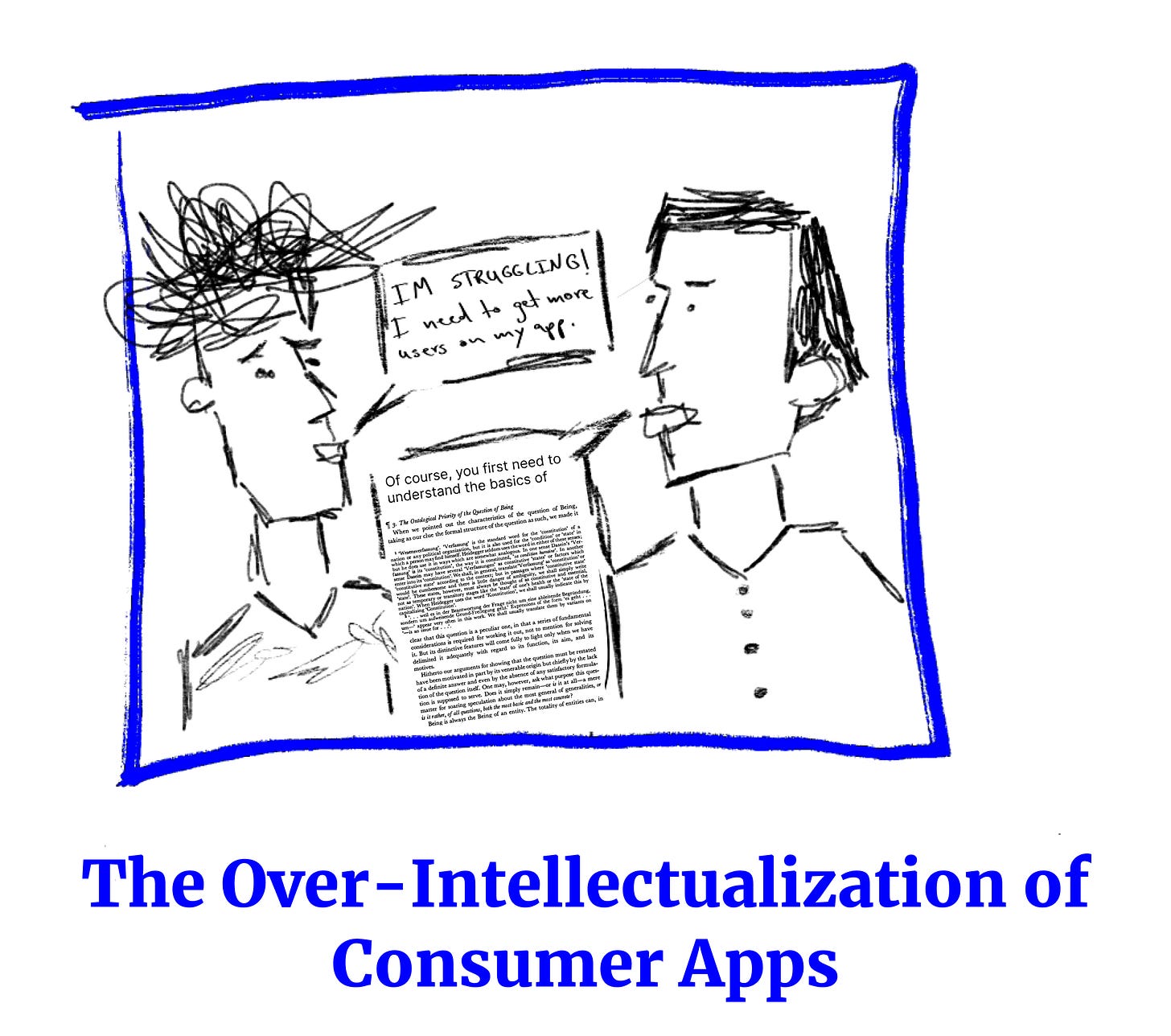The Over-Intellectualization of Consumer Apps
“We are revolutionizing the way we communicate…we’re transforming social bonding…we’re shifting the paradigm”
It’s been 15 minutes of pitching, and I still don’t know what the product does. I know it’s a consumer app because the founder mentioned it in the cold email. But there was no demo link or an App Store link. No traction or usage data either. We’re on slide 13, the founder is painting a picture of the world in 2035—but I still have no idea what the app does now!
Today, first-time founders are suffering from a severe case of over-intellectualizing consumer apps: an unnecessary and performative act of making their apps sound more than they are and more than they should be.
Why It Happens: VC Thinkboi Slop
This is a trickle-down effect of too many VCs writing too many fluff thought pieces: “thinkboi slop” (coined by one of my favorite contemporary philosophers, sophie). I believe it’s net positive for investors to share their thoughts publically. However, many of them, especially ones with little to no operational experience, lean on their Ivy Philosophy degrees and the latest McKinsey reports as the backbone of their arguments, so they end up writing pedantic pieces that sound profound but truly mean nothing. (Web3 is fertile land for this type of writing.)
Founders look up to these investors as the “gatekeepers of capital,” so they try to emulate their high-brow obscure explanations when pitching. To impress the philosopher VCs, founders try to act like philosophers too. “The Zeitgeist…the Paradigm…Always Shifting.” This has dire consequences on product thinking: consumer founders need to think like scrappy pirates and mercenaries, not pedantic Ivory Tower philosophers.
I saw a prime example of this a few years ago. A consumer app raised $10M+ from a reputable VC, pre-product, pre-traction… and the fundraising announcement was an exemplary thinkboi slop. It referenced Chauvet Caves, Girard’s mimetic theory, Don Norman, and the advent of the internet. All the good stuff. A pastiche of nonsensical claptrap to impress the polite society of venture Nepo babies and other self-proclaimed technologists with a penchant for pseudo-philosophy. The lead investor proudly re-shared the Thinkboi Slop Manifesto. The app launched, was around for four months, and now is dead. No longer listed on the investors’ profile. (I hope the founder learned from the experience and crushes it on their second try.)
Don’t get me wrong, I like philosophy—I actually love it!—but the best advice for founders is not found in René Girard's memetic theory or Straussian philosophy but rather in common sense: don’t run out of money, build something people want, charge for it.
The Only Thesis That Matters: Revenue + Traction
A good consumer app should be simple, focused, and direct → it should solve one thing really well. Ideally for a problem that the founders experience themselves. The pitch of a pre-seed first-time consumer founder should focus on one key problem, and how their product will solve it.
First-time founders, especially when young, have a higher bar to meet, so ideally the V1 is already out in the world and you have some preliminary traction data. You should have a vision slide where you can be as philosophical as you want, but most of the deck should be grounded in the product and the traction.
I’ve found that indie hackers manifest this mindset the best. In 2023, some of the apps that made the most money from the AI boom were Chat GPT wrappers founded by indie hackers in Poland and Turkey. While better-funded, better-philosophized alternatives, like Inflection’s Pi, wound down.
More founders should adopt the indie mindset and ignore intellectual posturing. Behind closed doors, the only thesis that investors care about is Money Up, Traction Up, Me Likey-Likey. If you can do this well, you will be able to reach any investor you want; just email me and I’ll help you.
(You can also email me if you aren’t quite there yet as well, always happy to jam with consumer founders!)





Ideally, VCs would pay attention and fund indie's thinking and strategy. But they are usually busy chasing self-proclaimed "soon-to-be unicorns", and only giving chances to founders with pre-existing connections, ivy-league education, etc.
The indie hacking community is ripe with incredible projecta being built in public. But VCs don't go out looking, they only wait for founders to come to them.